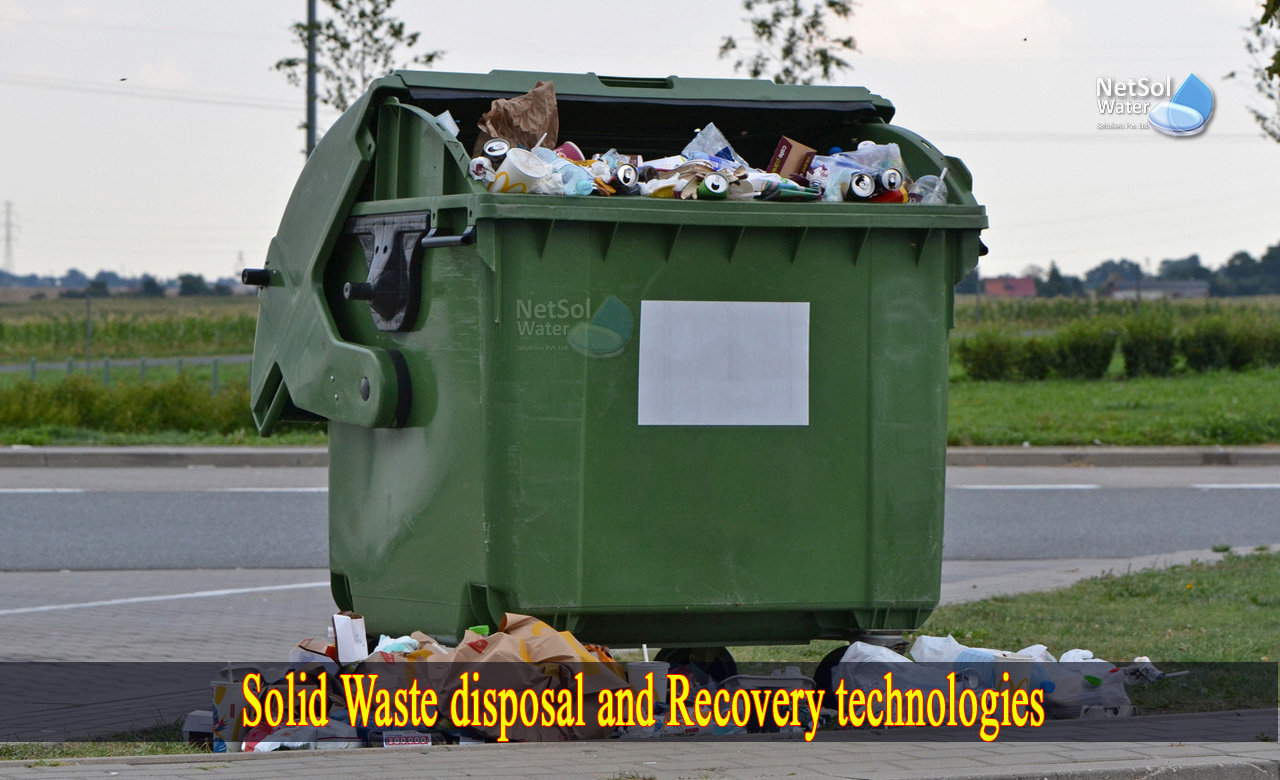What are the Solid waste disposal and recovery technologies?
With the country's growing population, municipal solid waste management (MSWM) has become a burden, not only due to environmental and aesthetic considerations, but also due to the massive amounts of municipal solid waste (MSW) generated every day.It is estimated that metropolitan India produces between 1,30,000 and 1,50,000 metric tonnes of waste every year. Solid garbage every day per urban resident is about 330-550 gram. This adds up to almost 50 million MT every year. By 2031, this will have increased to almost about 125 million MT.
When we talk about the MSW solutions and recovery technologies, we consider the following:
1: Composting
Composting is a regulated aerobic process that biologically "digests" MSW so that it can be recycled for other purposes such as plant nutrition, soil stabilization or soil addition for poor soil recovery.Depending on the feasibility of implementation, composting can be done at a decentralized level (home composting, bin composting, box composting, vermicomposting, in-vessel composting) or at a centralized level (windrow composting, in-vessel composting, aerated static pile). Both procedures necessitate extensive pre-processing. Composting can only be done with segregated organic matter.
2: Energy from Waste
When material recovery and composting of MSW isn't an option, energy recovery is proposed as a viable alternative. The fractions with high calorific values are either burnt or composted. The biodegradable part of the waste is anaerobically treated.The generated energy is either heat (incineration) or electricity (bio-methanation). In this way, biogas (methane) can be recycled or transformed into power.
3: Incineration
Incineration is a waste-treatment method that involves burning MSW at extremely high temperatures in the presence of oxygen producing ash, flue gas, and heat. Apart from the segregated fraction of the high calorific waste, it is possible to use unprocessed or slightly processed waste.The amount of energy that can be generated varies on the waste's composition, density, moisture content and presence of inert. About 65–80 percent of the energy in organic matter can be recovered as heat energy, which can be used in thermal applications.
Incineration should only be considered once appropriate material recycling and recovery systems have been implemented, or when alternative superior processing options are unavailable and land availability is a concern.
Waste-to-energy plants should typically be installed only in cities that can supply at least 1,000 tonnes per day (TPD) of waste. However, if incinerator plants are not operated properly and appropriate emission control measures are not implemented, these plants have the potential to generate severe environmental consequences through emissions and fly ash. As a result, special attention should be paid to complying with operational and emission regulations set forth in the SWM Rules of 2016, as well as the use of emission abatement technologies.
4: Biomethanation
It is the anaerobic (without air or, more specifically, free oxygen) digestion of biodegradable organic waste in a controlled environment with temperature, moisture, pH, and other factors. It is considered as one of the most technically viable option for the Indian Municipal Solid Waste or MSW due to its high organic and moisture content.
A biomethanation plant requires a reliable source of degradable organic waste that is free of inert materials as well as a long-term demand for the biogas produced under reasonable economic conditions. Depending on the practicality of the implementation and waste inflow, biomethanation plants can be operated at a decentralized (up to 5 TPD) or centralised level.
5: RDF
Refuse-derived fuel (RDF) is the non-recyclable combustible fraction of processed MSW with a high calorific value that is used as a source of energy or as a fuel for vehicles, generating steam and electricity, or as an alternative fuel in industrial furnaces and boilers. It is made up of a mixture of substances with increasing concentrations.
Netsol Water, as a sustainable solution provider, we are concerned about Environmental remediation and solid waste management in India. Thus, we provide a complete variety of standard and fully configurable solid waste management systems as well as their comprehensive maintenance. Choosing a trained, accredited, and experienced SWM specialist will considerably boost your chances of long-term satisfaction with your overall system. We have over 10 years of experience custom-designing and manufacturing wastewater treatment plants, water treatment plants, SWM systems, among other services.
Netsol Water is Greater Noida-based leading water & wastewater treatment plant manufacturer. We are industry's most demanding company based on client review and work quality. We are known as best commercial RO plant manufacturers, industrial RO plant manufacturer, sewage treatment plant manufacturer, Water Softener Plant Manufacturers and effluent treatment plant manufacturers. Apart from this 24x7 customer support is our USP. Call on +91-9650608473, or write us at enquiry@netsolwater.com for any support, inquiry or product-purchase related query.



